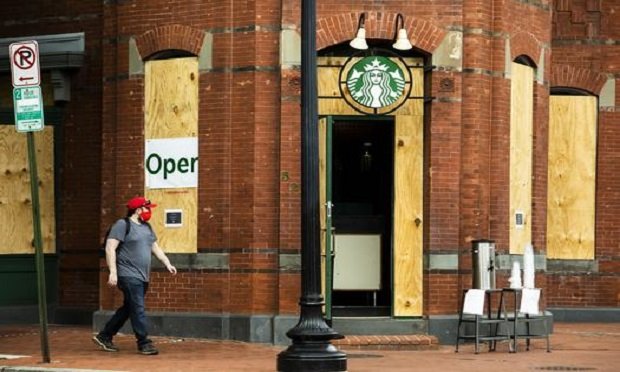 A Starbucks store, partially reopened during the Coronavirus pandemic, is boarded up to protect against vandalism during the days of demonstrations protesting the killing of George Floyd and police brutality, Washington, D.C. June 6, 2020. (Photo: Diego M. Radzinschi/ALM)
A Starbucks store, partially reopened during the Coronavirus pandemic, is boarded up to protect against vandalism during the days of demonstrations protesting the killing of George Floyd and police brutality, Washington, D.C. June 6, 2020. (Photo: Diego M. Radzinschi/ALM)
The COVID-19 pandemic has brought a wave of business interruption claims and related coverage lawsuits from businesses impacted by widespread closures.
These businesses already face significant hurdles in obtaining coverage for pandemic-related losses, as insurers and policyholders litigate over whether COVID-19 contamination and mandatory closures to force social distancing measures to constitute "direct physical loss of or damage to property" sufficient to trigger coverage under business interruption policies. In these suits, insurers have argued that these policies provisions were written to insure against natural disasters that cause tangible physical damage to property such as hurricanes and earthquakes, not viral pandemics. At least one court has agreed.
Recommended For You
Want to continue reading?
Become a Free PropertyCasualty360 Digital Reader
Your access to unlimited PropertyCasualty360 content isn’t changing.
Once you are an ALM digital member, you’ll receive:
- Breaking insurance news and analysis, on-site and via our newsletters and custom alerts
- Weekly Insurance Speak podcast featuring exclusive interviews with industry leaders
- Educational webcasts, white papers, and ebooks from industry thought leaders
- Critical converage of the employee benefits and financial advisory markets on our other ALM sites, BenefitsPRO and ThinkAdvisor
Already have an account? Sign In Now
© 2025 ALM Global, LLC, All Rights Reserved. Request academic re-use from www.copyright.com. All other uses, submit a request to [email protected]. For more information visit Asset & Logo Licensing.








